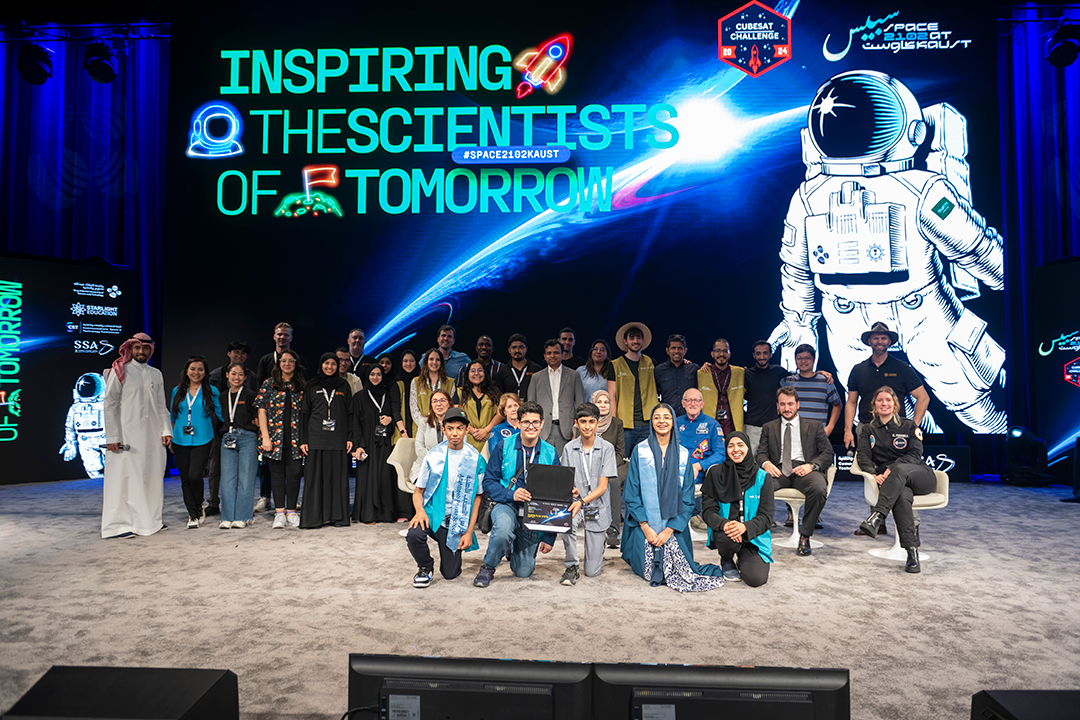KAUST’s Space 2102 program inspires talented Saudi youth In STEM And space

KAUST collaborated with the Saudi Communications, Space and Technology Commission (CST) and the Saudi Space Agency (SSA) again this year to carry out another successful space camp for gifted Saudi youths with ambitions to go to space.
King Abdullah University of Science and Technology (KAUST) has reaffirmed its commitment to Saudi Vision 2030 and young talent development with the stellar conclusion of its Space 2102 program, inspiring the Kingdom’s next generation of science, technology, engineering and mathematics (STEM) leaders and aspiring astronauts.
Through rousing lectures, software training and enrichment activities, the holistic program, April 21-25, advanced participants along their educational paths. In part highlighting KAUST’s distinguished laboratories and groundbreaking research, Space 2102 continued the legacy established through last year’s widely praised inaugural Space 2101.
“In celebrating Space 2102’s resounding success, KAUST is fulfilling the dreams and ambitions of talented young Saudis toward critical fields in STEM and space,” said Dr. Najah Ashry, KAUST Vice President for Strategic National Advancement (SNA). “With transformative early-engagement investments, we nurture the next generation of science-based leaders and entrepreneurs, heralding a new era of research and exploration for the Kingdom.”
Collaborating with the Saudi Communications, Space and Technology Commission (CST) and the Saudi Space Agency (SSA), globally renowned educators and astronauts worked in conjunction with KAUST faculty and mentors, igniting the STEM passions of more than 150 Saudi youth, aged 13-15, during the immersive five-day science camp.
Mariam Fardous, SSA astronaut, praised Space 2102 for its practical learning and knowledge sharing, which aligns KSA’s educational outputs to its STEM and space-sector ambitions. She joined NASA astronauts Kathryn Thornton and Sam Gemar, as well as European analog astronaut Charlotte Pouwels, in inspiring Saudi youth via KAUST’s program. “I’m truly honored to have helped launch the STEM journeys of our future leaders in science and space.”
Faculty presentations and panel discussions were integral parts of a comprehensive experience. Prof. Mani Sarathy, associate director of the Clean Combustion Research Center, PSE Division, emphasized the Kingdom’s space industry will rely on ambitious young people such as those who partook in Space 2102. Assoc. Prof. Francesca Benzoni, Marine Science, called on each student at this year’s space camp in time to consider attending KAUST.
CubeSat Challenge
Space 2102 culminated with the CubeSat Challenge, whereby student teams used STEM tools to design and test their own CubeSat missions, focusing on Red Sea coral preservation and rehabilitation. The winning team included Imaad Rehman, The KAUST School (TKS), Talal AlZuhairi, Riyadh Schools, Leen Albasher, Admire International Academy in Dammam, and Maryam Bazroun and Abdullah Alhayik, both from Dammam’s Al Tahtheeb Schools.
For Bazroun, 13, and Alhayik, 14, Space 2102 cultivated self-confidence, nurtured STEM passions, and developed young Saudi talent — one of the Kingdom’s most valuable resources, Bazroun said. “This program at KAUST changed everything for me. It has changed who I am, and my perspective on life. It helps with everything I am as a student.”
Space 2101 trip
Before Space 2102 marked the next frontier in talent development for Saudi Arabia’s future STEM professionals, the winning team from last year’s Space 2101 enjoyed a cosmic thrill — witnessing two SpaceX launches at the NASA Kennedy Space Center as part of their prize trip to the U.S., Feb. 27 to March 7. Gemar guided the youth through these launches and showed them the center’s space exploration exhibits as well, heightening their interest in space.
Among the Space 2101 winning team members to see the launches was Kawthar Alhassan, from Al-Anjal National Schools. She described the enlightening excursion as enhancing her passion for science and space. Alhassan hopes her participation in KAUST’s program, which advanced her STEM knowledge and skills, ultimately leads her to one day become an astronaut. “It was a life-changing experience, helping me to be independent and self-confident.”

